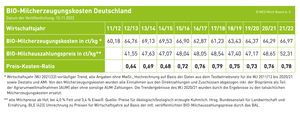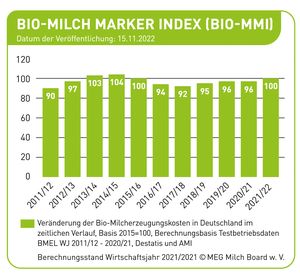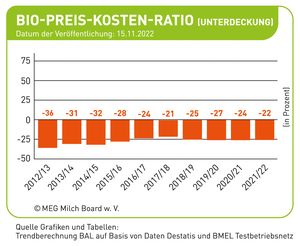(Brussels, 15 November 2022) According to the latest production cost and producer price calculations in the organic sector, producers in Germany received an average 52.31 cents/kg of organic milk in the accounting year 2021/22. However, the production costs, including a fair remuneration for farmers, amounted to 66.97 cents/kg. This means that producers were left with a cost shortfall of a good 22%.
In the accounting year in question, organic milk producers received an average 64.08 cents/kg ; 52.31 cents/kg through the milk price and 11.77 cents/kg in the form of subsidies. Given that farming inputs and general operating costs amounts to 55.26 cents/kg post deduction of income from cattle sales, the real income for farmers was a mere 8.82 cents/kg of organic milk. That is just 38% of the income that would be appropriate based on applicable collective agreements. This appropriate income amount was calculated based on an average hourly wage of about 25 euros (including employer contributions). In light of these facts, the slogan socially and economically sustainable does not hold true in the case of organic milk production.
The data on milk production costs in the German organic milk sector is compiled by the Bureau for Rural Sociology and Agriculture (BAL) and is updated annually.
All dairy farmers are struggling with the current cost increases. Compared to conventional milk, producer prices in the organic sector have, nonetheless, increased to a much lesser extent, which means that a significant shortfall is commonplace.
Milk Marker Index for organic milk
The Milk Marker Index (MMI) for organic milk illustrates the evolution of costs for organic milk production. For the accounting year 2021/22, the MMI for organic milk is 100, which means that the production costs for German organic producers were the same as in the base year 2015/16 (2015/16 = 100). In comparison, the MMI for organic milk in the accounting year 2016/17 was 94, which means that costs increased by 6 index points in this period.
Price-cost ratio (shortfall)
The price-cost ratio showcases to what extent the prices paid to producers cover milk production costs on organic dairy farms. For the accounting year 2021/22, producers were able to cover only 78% of their production costs through the milk price; this means that the cost shortfall was 22%.
Production cost studies for eight key milk producing countries
Cost calculations are regularly carried out not only for organic production but to determine the average across all dairy farms as well. Even this exercise shows that dairy farmers are not paid cost-covering milk prices. You can find the milk production cost calculations for Belgium, Denmark, Germany, France, Ireland, Lithuania, Luxembourg and the Netherlands for 2019 here as well as an update for 2021 with projections for the first quarter of 2022 here.
A chronic shortfall between production costs and milk prices – what is the solution?
The European Milk Board (EMB) advocates for a crisis instrument anchored in legislation to counteract the chronic cost shortfall in the dairy sector. The Market Responsibility Programme (MRP) observes and reacts to market signals by, for example, temporarily adjusting production during times of crisis.
You can find a short description of the EMB Market Responsibility Programme here.
Background:
The European Milk Board (EMB), the German dairy farmers’ association BDM and the German producer organisation MEG Milk Board have commissioned the German Bureau for Rural Sociology and Agriculture (BAL) to carry out a study on production costs for organic milk and to update this study annually. It is an important complement to the Milk Marker Index (MMI), which has been published since 2013, as well as to the EMB’s reports on general milk production costs in different EU Member States.
Contact:
EMB press office – Vanessa Langer (EN, DE, FR): +32 (0)484 53 35 12




